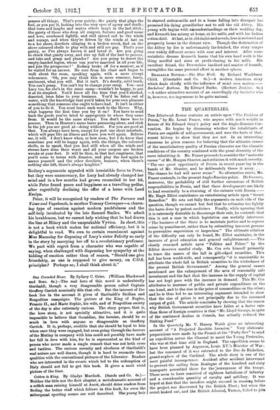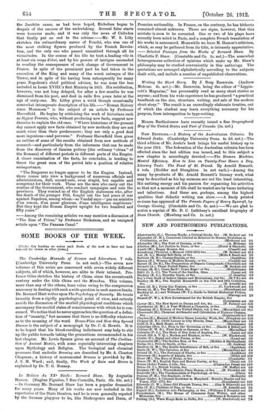THE QUARTERLIES.
THE Edinburgh Review contains an article upon "The Problem of Persia," by Mr. Levet Fraser, who argues with much weight in favour of Sir Edward Grey's policy and the ♦nglo-Russian Con- vention. He begins by discussing whether the inhabitants of Persia are capable of self-government, and uses the facts of Orel. recent history to show that they are not. In an interesting excursus he gives reasons for believing that the ultimate causes of the unsatisfactory quality of Persian character are the climatic conditions of the country combined with the great diversity of the races inhabiting it. Mr. Fraser proceeds to consider the "meteoric career" of Mr. Morgan Shuster, and criticises it with much severity. " The one great opportunity of Persia in recent years lay in the hands of Mr. Shuster, and he deliberately threw it away. . . • The chance he had will never recur." No alternative exists, Mr•. Fraser contends, to the present Anglo-Russian policy. He foresees, moreover, the probability of still further extensions of British responsibilities in Persia, and that these developments are likely to lead eventually to a straining of the entente with Russia.— Mr. Hugh Elliot contributes an entertaining article upon " Secret Remedies." He sets out fully the arguments on each side of the question, though we cannot but feel that he estimates too lightly the harm done by patent medicines. Finally, while agreeing that it is extremely desirable to discourage their sale, he contends that this is not a case in which legislation can usefully intervene. .‘ The business of the State is to maintain justice and to repress crime by punishment, rather than by submitting innocent persons to preventive supervision or inspection." The ultimate solution of the difficulty can only be found, Mr. Elliot maintains, in the increase of good education and general enlightenment. —The closely reasoned article upon "Politics and Prices" by the Editor deserves careful study. Mr. Cox sets himself primarily to trace the causes of the fall in gilt-edged securities. This fall has been world-wide, and consequently "it is unscientific to attribute the whole fall in British securities to the wickedness of the present British Government." Among the general causes mentioned are the enlargement of the area of reasonably safe investment and the fact that the increase in the supply of capital has not kept pace with the increase in demand. This Mr. Cox attributes to increase of public and private expenditure on the one hand, and to the rise in the price of commodities on the other ; and he is thus led to an interesting argument intended to show that the rise of prices is not principally due to the increased output of gold. The article concludes by showing that the reason why British Government securities have fallen at a faster rate than those of foreign countries is that "Mr. Lloyd George, in spite of the continued decline in Console, has actually reduced the Sinking Fund " In the Quarterly Mr. V. Hussey Walsh gives an interesting account of "A Projected Jacobite Invasion." Very elaborate preparations were made by the French at the "Forty-five" to send an expedition across the Channel to assist the Young Pretender, who was at that time still in England. The expedition seems to have been planned by Argenson, Louis XV.'s Minister of War ; but the command of it was entrusted to the Due de Richelieu, grand-nephew of the Cardinal. The whole story is one of the most painful incompetence. Accident after accident intervened to prevent the sailing from Boulogne of the hundred and sixty transports assembled there for the :oonveyanee of the troops. These seem to have consisted of eighteen battalions of infantry and a considerable quantity of cavalry and artillery. It was hoped at first that the invaders might succeed in crossing before the project was discovered by the British Fleet ; but when the secret leaked out, and the British Admiral, Vernon, failed to join the Jacobite cause, as had been hoped, Richelieu began to despair of the success of the undertaking. Several false starts were however made, and it was only the news of Culloden that finally put an end to the scheme.—Mr. W. S. Lilly sketches the extraordinary career of Fouche, who was one of the most striking figures produced by the French Revolu- tion, and the only one who passed unscathed through all its vicissitudes. In the course of his life he took a leading rdle in at least six coups teetat, and by his powers of intrigue succeeded in evading the consequences of each change of Government in France. In spite of the prominent part he had taken in the execution of the King and many of the worst outrages of the Terror, and in spite of his having been subsequently for many years Napoleon's chief political adviser, he was none the less included in Louis XVIII.'s first Ministry in 1815. His retribution, however, was not long delayed, for after a few months he was dismissed from his post, and died in exile five years later at the age of sixty-one. Mr. Lilley gives a vivid though occasionally somewhat intemperate description of his life.—"Roman History since Mommsen " is the subject of an article by Professor Haverfield. He begins by criticising the work of historians such as Signor Ferrero, who, without producing new facts, suggest new theories to explain the old ones. " Where historians of the present day cannot apply new facts obtained by new methods they are not much wiser than their predecessors ; they are only a good deal more ingenious—and perverse." Professor Haverfield then gives an outline of some of the results obtained from new methods of research—and particularly from the inferences that can be made from the discovery of Samian pottery (the ordinary "china" of the Romans) of different periods in different parts of the Empire. A closer examination of the facts, he concludes, is tending to throw the great men of the period into a position of relative unimportance.
"The Emperors no longer appear to be the Empire. Instead, there comes into view a background of numerous officials and administrators, dull, second-rate, even stupid, but capable and competent for their work. These are the men who carry out the routine of the Government, who conduct campaigns and rule the provinces. They remind us of the English statesmen who, after the death of the younger Pitt, fought out the last years of war against Napoleon, among whom—as Vandal says= pas un ministre d'un renom, d'un passé glorieux, d'une intelligence superieure.' But they kept the Roman Empire upright for two hundred and fifty years."
—Among the remaining articles we may mention a discussion of "The Rise of Prices," by Professor Nicholson, and an unsigned article upon " The Panama Canal."



















































 Previous page
Previous page